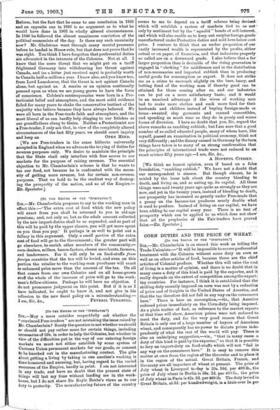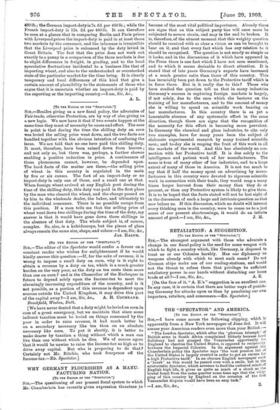CORN DUTIES AND THE PRICE OF WHEAT. (TO TIM EDITOR
OF THE -sexcrevoam Sin,—Mr. Chamberlain is on record this week as telling the Trade-Unionists:--"It will be impossible to secure preferential treatment with the Colonies without some duty on corn as well as on other articles of food, because these are the chief articles of Colonial produce. Whether this will raise the cost of living is a matter of opinion, and there is no doubt that hi many cases a duty of this kind is paid by the exporter, and it really depends on the extent of competition among the export- ing countries. For instance, I think it is established that the shilling duty recently imposed on corn was met by a reduction of price and of freights in the United States of America, and that the tax therefore did not fall in any way on the consumers here." There is here an assumption,—viz., that Americti reduced prices immediately on the Corn-duty being imposed. As a plain matter of fact, as reference to the market reports at that time will show, American prices were not reduced to meet the duty, and for the very good reason that Gmat Britain is only one of a large number of buyers of American wheat, and consequently has no power to dictate prices hide. pendently of what the rest of the world will pay. • There is also an underlying suggestion,—viz., "that in many eases a duty of this kind is paid by the exporter," so that it is possible to levy an import-duty on food-stuffs which will not "fall in any way on the consumers here." It is easy to remove this matter at once from the region of the theoretic and to place it in the region of the actual. Great Britain, France, and Germany are all importers of wheat at present. The price of July wheat in Liverpool to-day is 29s. 101 per 480 lb., the price of July wheat in Berlin is 36s. 2d. per 480 lb., the price of July wheat in Paris is 42s. 3d. per 480 lb. The duty levied in Great Britain, at 3d. per hundredweight, is a little over Is. per
480 lb.; the German import-duty is 75. 6d. per 480 lb.; while the French import-duty is 12s. 2d. per 480 lb. It can therefore be seen at a glance that in comparing Berlin and Paris prices with Liverpool prices the import-duty is paid in at least those two markets by the consumer, and the inference is irresistible that the Liverpool price is enhanced by the duty levied in Great Britain. The fact that the price does not work out exactly to a penny in a comparison of the three markets is due to slight differences in freight, in grading, and to the local speculative fluctuations incidental to a business like that of importing wheat, and also to the understoeked or overstocked state of the particular market for the time being. It is clearly temporary and local differences of this kind that give a certain amount of plausibility to the statements of those who argue that it is uncertain whether an import-duty is paid by the exporting or the importing country.—I am, Sir, &c., A. L.











































 Previous page
Previous page